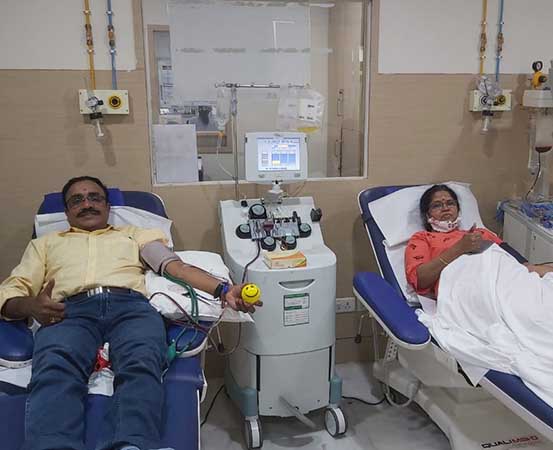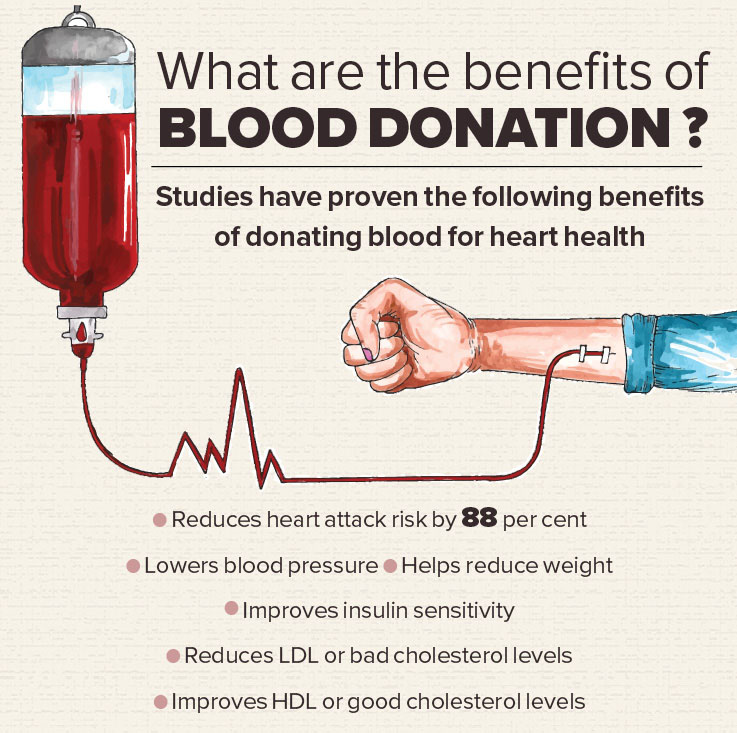
Bhoopendran V, a sexagenarian who runs a fair price shop in Bengaluru, looks a decade younger, is fit and has had no heart problems, diabetes or hypertension. Wondering what the secret is to his happier and healthier life? Blood and single platelet donation (SPD), he says.
Several studies prove that donating blood regularly can reduce the risk of heart attacks. A study of a cohort for nine years, which was published in the American Journal of Epidemiology, proved that blood donors had 88 per cent reduced risk of acute myocardial infarction (heart attack), compared to others.
How does blood donation help the heart?
Dr Puneeth Varma, consultant, adult cardiology, Narayana Health City, Bengaluru, says donating blood reduces the risk of heart attack as it reduces iron overload. “Increase in iron can lead to increased free radicals, which can cause oxidative stress. Oxidative stress can lead to endothelial damage, which in turn, leads to plaque formation or blocks in the arteries. Over a period of time, it can cause plaque rupture and lead to heart attacks,” he says. Donating blood regularly ensures iron diffusion, which can reduce free radicals and oxidative stress and hence, reduce endothelial damage.
Donating blood also helps reduce the viscosity of blood. Dr Puneeth adds that it improves blood flow, reducing stress on the vessels and endothelial damage. “The risk of peripheral vascular diseases and stroke also reduce due to blood donation,” he says, adding that several studies also show that it reduces other risk factors for heart problems like cholesterol, blood pressure and diabetes.
What are the benefits of blood donation?
Studies have proven the following benefits of donating blood for heart health:
- Reduces heart attack risk by 88 per cent
- Lowers blood pressure
- Helps reduce weight
- Improves insulin sensitivity
- Reduces LDL or bad cholesterol levels
- Improves HDL or good cholesterol levels
Dr Manohar KN, a Bengaluru-based consultant physician, adds that blood donation also gives an opportunity to the donor to check haemoglobin levels, blood pressure and pulse before donation, which can help reduce the rate of an event of heart attacks.
The benefits of blood donation are more significant among men than women. Dr Puneeth says, “Blood and iron levels in women are not as high as men due to periodical cycles and hence, they are at lower risk compared to men, even if they do not donate blood regularly. But donating blood can help reduce the risk of a heart attack.”
How often can you donate blood?
Dr Manohar says one can do whole blood donation once in three months and platelet donation once in two weeks. “People with diabetes and blood pressure can also donate, provided the diseases are well controlled. It is prudent to take a prior approval by the treating physician as well,” he adds.
Bhoopendra has been donating blood and platelet for 35 years. He started donating without the knowledge of his family when he was 27 years old. He claims he has done whole blood donation 64 times and SDP 237 times so far. He has motivated his wife too for blood donation and the couple has donated blood 33 times together. He says he feels young in heart, mind and body. An advocate for blood donation, he also ensures that he eats healthy home-cooked food and does not smoke or drink so that his haemoglobin levels are healthy.
Can someone with a heart condition donate blood?
People with existing heart conditions can donate blood if their haemoglobin levels and heart pumping capacity are normal. Dr Puneeth says, “Heart failure can cause depletion of blood cells. Hence, people with heart failure are not recommended to donate blood. In cases of hemochromatosis (iron overload), people cannot donate blood as the donation cannot be used.” Dr Manohar adds one cannot also donate blood if they are at risk of infections like HIV, hepatitis B and C, which can transmit through blood.
Tips for blood donation
Dr Manohar shares a few tips for blood donation
- Do not donate on an empty stomach.
- Donate blood 20 to 30 minutes post-meal.
- Have a good night’s sleep before donation.
- Do not donate if you have a fever or are on antibiotics.
- Drink water before and after donation.
















